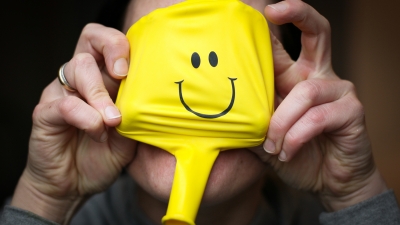Health & happiness
Imagine a healthy body. What do you see? Imagine an unhealthy body. What do you see now?
I'm going on a limb here and say that you first pictured somebody thin, fit or muscular, and then somebody fat. Am I correct? Through advertisements, social media and movies we get familiarised with the 'healthy body'. It is something admirable and worth striving for. The associations surrounding images of the fat body are different: they have to do with sickness, dirtiness and death. The distinction between the two feels justifiable. After all, everyone should try to be healthy. It's a good thing that we try to motivative people to look less fat. Right? In her lecture 'Not Just Any Body' social scientist Dr Noortje van Amsterdam (Utrecht University) argues that these images actually have a different consequence than we might expect.
Fat = bad
When we analyse campaigns that aim to combat obesity we can start to understand their rhetoric. People with a bigger size are portrayed as unhealthy, lazy and lacking self-control. These kind of claims go beyond the biomedical domain and are moral statements. That's why Van Amsterdam encourages us to look at health not only from a biomedical point of view, but adopt a social perspective too. In our way of thinking, the responsibility for our health is placed on the individual. If you become fat, it is your own fault. And to add to that: in letting yourself become overweight, you're letting yourself become a burden for society.
"You just feel… as a fat person you have the idea that you are not allowed to be, because you really just don't belong. You are just the one… well how to explain? You don't count. You are dirty, fat, you smell, those kind of things." - quote from an interview Van Amsterdam conducted for her research
The aspect we tend to overlook is how this moral discourse affects people who do not adhere to the bodily norm. In her research Van Amsterdam interviewed high school students and adults who identified as 'fat' or 'bigger sized'. The interviews she conducted show how people internalise feelings of shame, guilt and failure in reaction to normative ideas of health. Van Amsterdam also refers to research that shows bigger people have a harder time getting a job and are taken less seriously when visiting a doctor for medical problems. Our discourse is making people feel bad about theirselves and creates unequal opportunities for them.

Can we create empathy?
Within this normative framework, the stigmatisation of bodies that don't adhere to the standard becomes 'acceptable'. This leaves fat people facing some serious barriers in life that are hardly recognised by most of us. A first step to change this situation would be to replace our feelings of disdain with empathy. Or as the famous feminist writer Roxane Gay says: "I really wish people would see fat people as humans." In her memoir Hunger, she writes about her struggles with food, weight gain and the stigmas fat people face. Unfortunately, the fear of fat is something many of us have internalised. Most people will recognise the feelings of guilt or shame that follow after having eaten too many french fries or too much ice cream. Most people will also feel bad about gaining weight. It shows that our ideas of the healthy body and the surrounding moral discourse affects everybody. We can all gain from deconstructing health in terms of body size. Everyone should be allowed to be happy, not just people that have an 'ordinary' body size.





